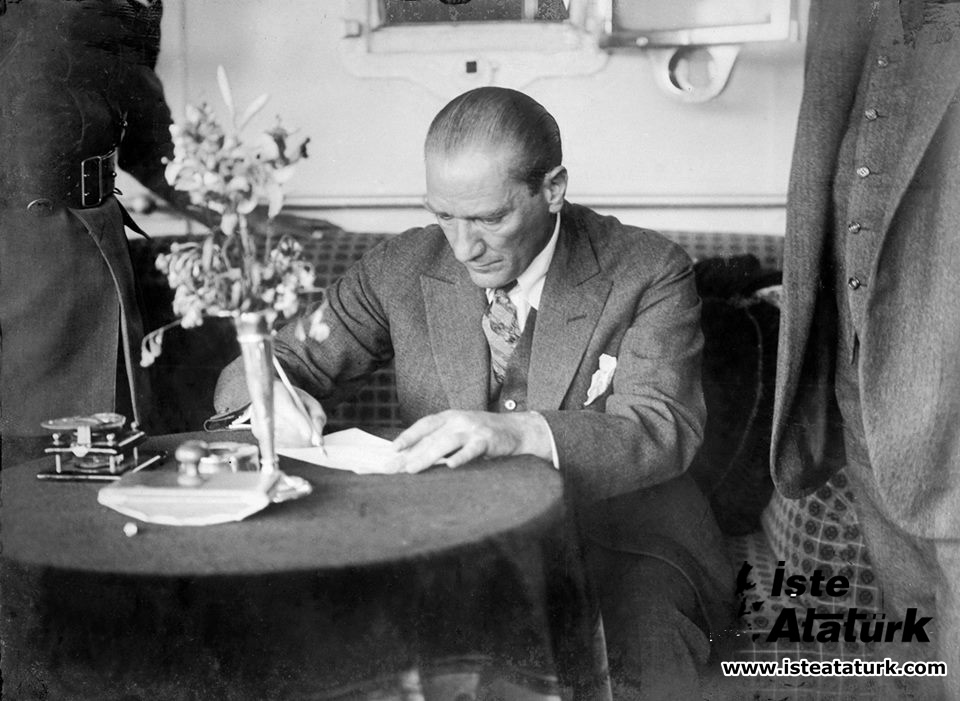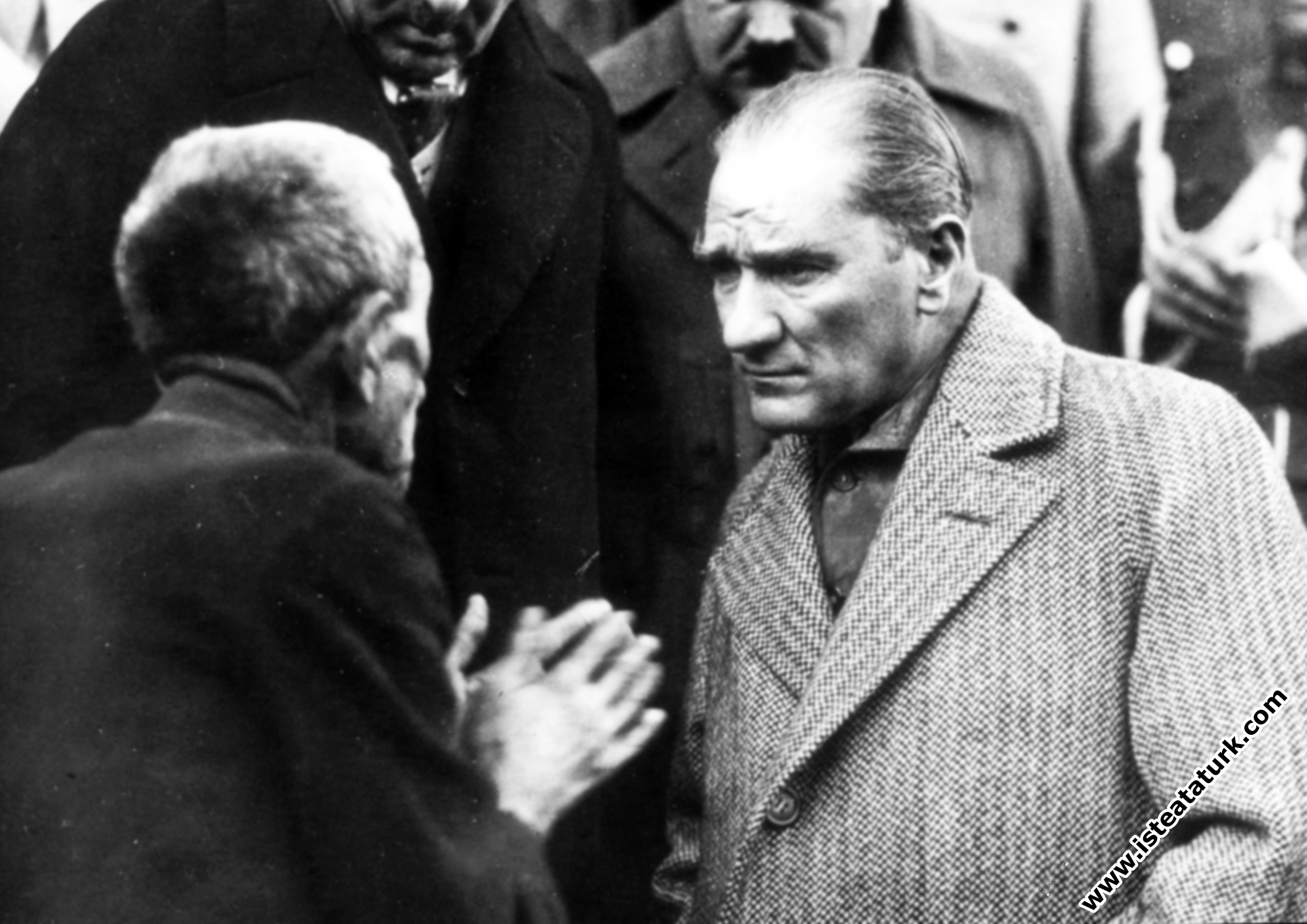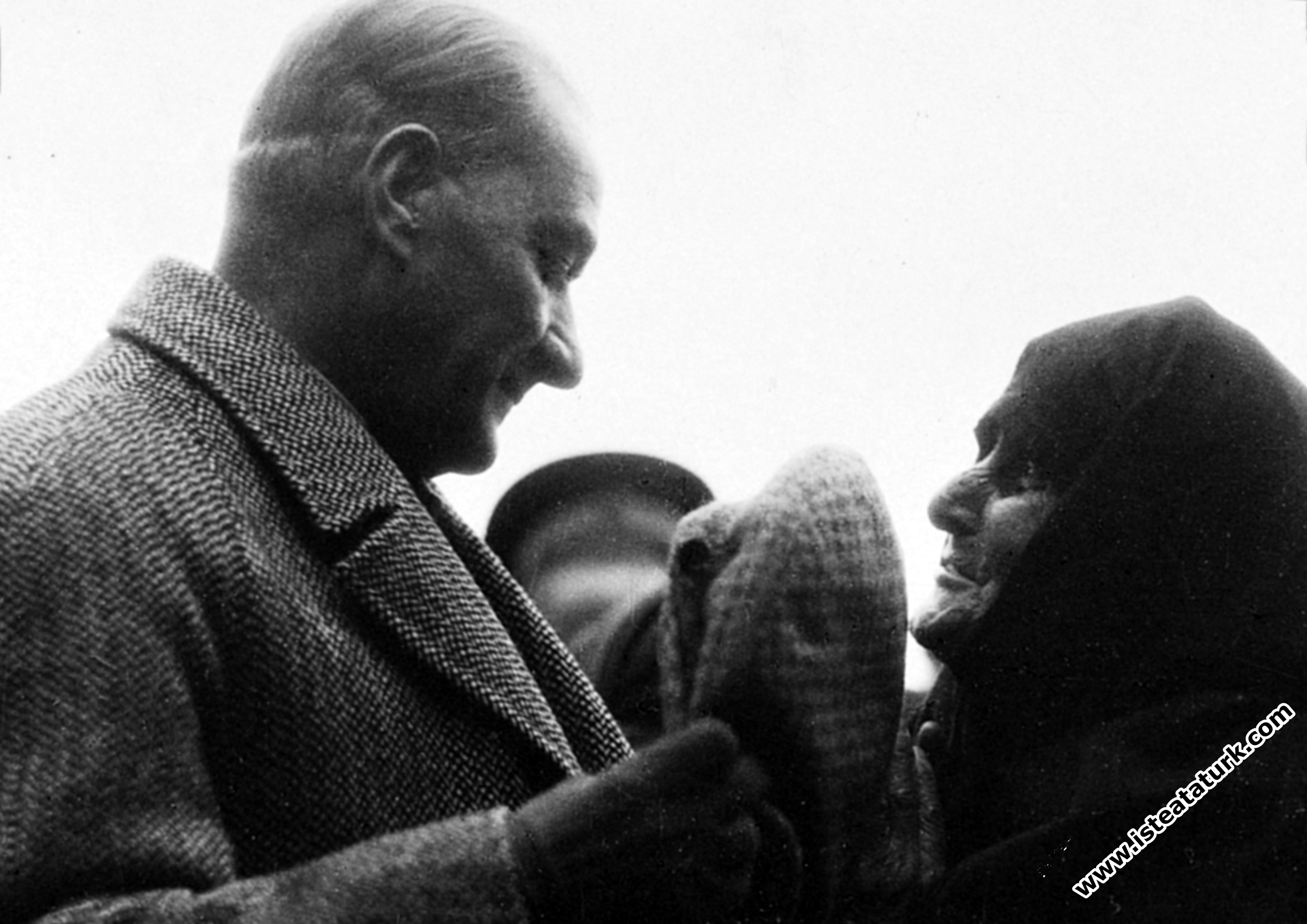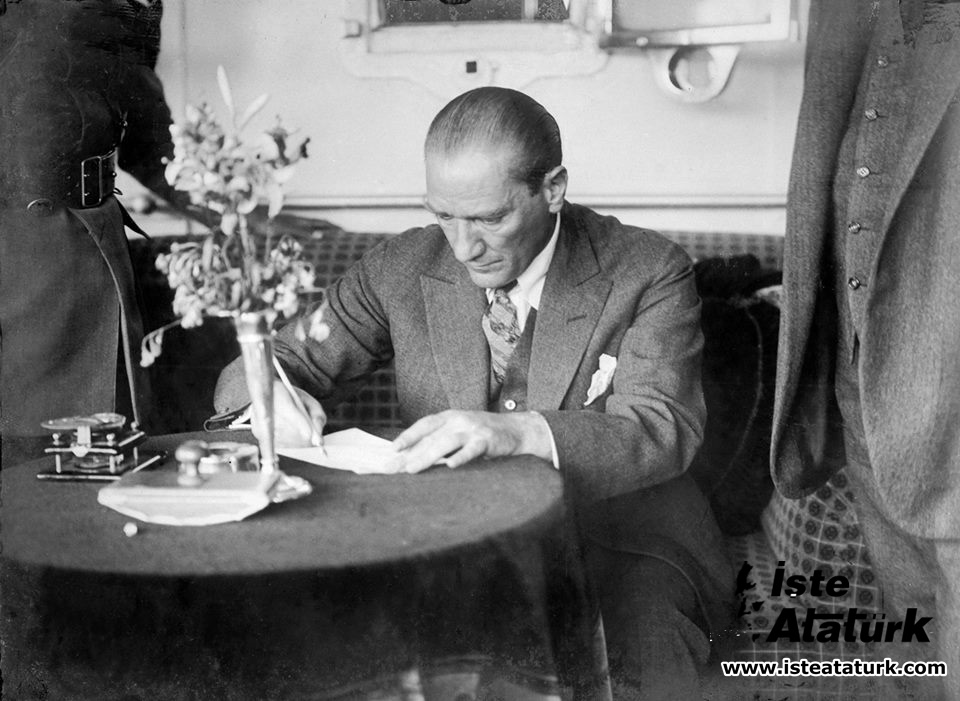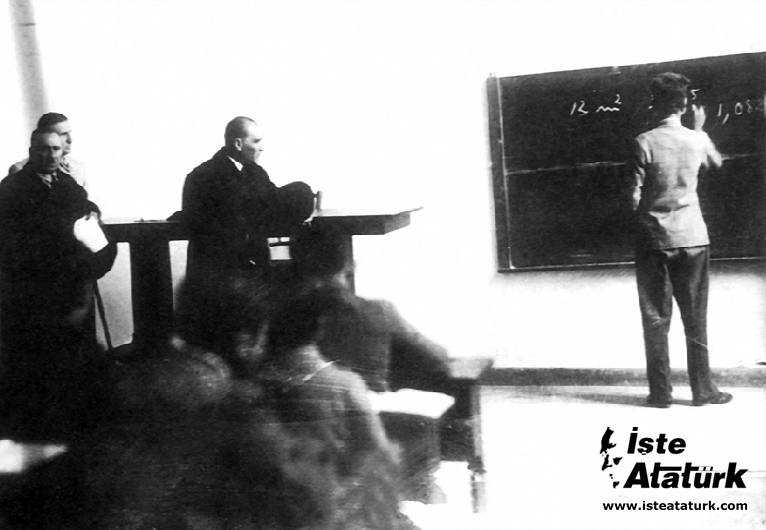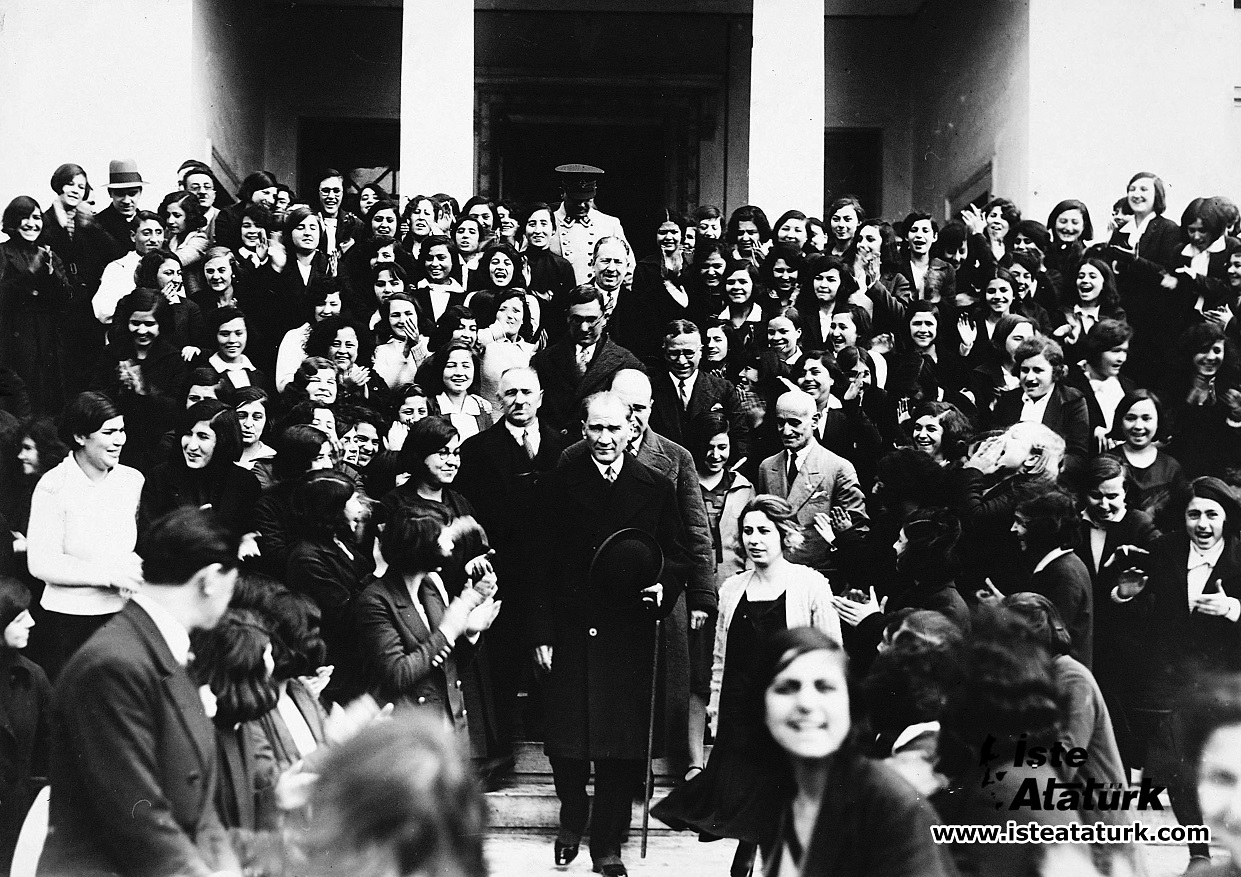
The Duty of Ensuring the Continuity of Atatürk's Principles and the Role of Youth in This Duty
Character Size
“O Turkish Youth! Your first duty is to protect and defend the Turkish independence and the Turkish Republic forever… The power you need is in the noble blood in your veins.” Mustafa Kemal Atatürk
The Duty of Ensuring the Continuity of Atatürk's Principles and the Role of Youth in This Duty
Summary
Atatürk realized the Turkish Revolution and his greatest work is the “State of the Republic of Turkey”. Atatürk, who started the National Struggle, was young. He always acted together with the youth, whether he was establishing the state or realizing the revolutions, expecting great things from them for the future and entrusted the Republic to them. Atatürk also set the goal of "raising our national culture above the level of contemporary civilization". In order to achieve this goal, it is imperative that Turkish youth be raised as healthy, hardworking and Kemalist. Atatürk expressed his belief and hope in youth in many of his speeches. Turkish youth should adopt Kemalism, which is a “national ideology”, and thus fulfill their duties towards Atatürk, his state and his nation. Meanwhile, the state, according to Article 58 of the Constitution; It has a duty to "protect the youth".
Entrance
The Turkish Revolution was realized by Atatürk in a short time and at the end of a great change in Turkish society, and his greatest work is the "State of the Republic of Turkey"1. Atatürk said that this great change he started was not over and said, “We will raise our national culture above the level of contemporary civilization”2. In order to have the “working power” required to reach this goal, it is imperative that young people be raised as healthy, physically strong, honest and hardworking3.
Atatürk left a legacy that opened all the doors of freedom in the modern world to future generations. This legacy, which is the foundation of the “Turkish Revolution”4 and the assurance of the future of our nation, is Atatürk's Principles. The Turkish nation should aim to develop the understanding of reason, science and nationalism, which are the basic principles on which Atatürk's principles and reforms are based, with a revolutionary view. With the loss of this dynamic structure of revolutionism, development stops and the nation and state regress. However, the dynamic ideal of the Turkish nation; To raise its existence as a civilized and prosperous nation, to rise above modern civilization, and to do this with the pride of being Turkish. The Turkish youth, who will "understand and explain the ideology of the homeland's causes and keep it alive from generation to generation" and always keep Atatürk's principles alive in their minds, has great duties.
A. Turkish Revolution and Youth
Revolutionism in Kemalism; progress, innovation and modernization as a whole. However, in order for the expected development to occur, the understanding of revolutionism must be adopted by everyone and applied with the same meticulousness. Young people have great responsibilities in the survival, protection and development of Atatürk's principles. In this respect, it would be appropriate to dwell on the relationship between Atatürk's reforms and the results of Atatürk's principles and youth.
When Atatürk was Mustafa Kemal Pasha in May 1918, with his own handwriting on a picture; “Despite everything, we are definitely walking towards a light. The strength that keeps this faith alive in me is not only my endless love for my beloved country and nation; It is because I see a youth trying to shine and seek light with the love of homeland and truth only in the darkness, immorality and charlatanism of today,5 by writing, "In those days when the war ravaged the Ottoman Empire and its nation, the youth" provided us with a proof of their belief that they would turn these negativities into positive. has left.
Actually, “youth” is not a social class, but it has always been an important “social force”. Youth is the mirror of the future of societies6. We see that Atatürk identified this power of the youth even before the National Struggle.
When he started the National Struggle, it was the young people who understood and supported him. Because the Turkish youth, in the big rallies they held in Istanbul, announced the rightful voice of the Turk to the world and gave great power and support to Atatürk. Even during the days of the Sivas Congress, Hikmet, a student of Military Medicine7, attended the congress on behalf of the youth of higher education in Istanbul and made an impassioned speech against the idea of mandate8. Atatürk trusted and believed in this youth forever and with an unshakable feeling. As early as 1919, “We will leave everything to the youth… They are the hope of the future, their luminous flowers. All my hope is in youth,” he said. Addressing the children who met him in Bursa on October 17, 1922; “Little ladies, little gentlemen! You are all a rose, a star, a light of your horse (future). (You are the light of happiness) You are the one who will make the country shine. Think about how important and valuable you are and work accordingly. We expect a lot from you; Girls, children!”10, Atatürk entrusted his greatest work, the Republic, to the youth. Also, his gift of 23 April as "Children's Day" and 19 May as "Youth and Sports Day" is important in terms of showing the hope he has for Turkish children and youth11.
The cadre that started the National Struggle was under the age of 40, especially Atatürk. At a young age, they established the young Turkish Republic by leading the Turkish War of Independence to Victory.
Atatürk said many words about the trust he had in the Turkish youth during the Revolutions period, as he did during the War of Independence. In the days when he declared the Republic (1923), he said: “A clean generation is growing from the heart of my nation. I will leave this work to them, and I will not be left behind.”12. Only the youth can keep the Turkish revolution and its foundational principles alive. For this reason, while concluding his Great Speech, he stated that he entrusted the innovations and the established state to the youth in his “Address to the Youth”13. Again, he told his friends the evening he finished the infrastructure work of his work called Nutuk; “We wrote history as we lived it, but it is necessary to entrust the future to those who believe, protect and keep the republic alive”.14 He said the laconic saying.
Atatürk loves and trusts the Turkish nation, and he clinches this with the words “Turk, Praise, Work, Trust!”15. On the other hand, he wanted to raise a youth who believed in himself. While conducting the National Struggle, establishing the Republic of Turkey and realizing the revolutions, he gained strength from the Turkish youth.
Youth is the spring of life, the peak of excitement, courage, vitality and power. Atatürk defines youth as follows: “What is youth? … I understand that the youth are the ones who will adopt the ideas and ideologies of this revolution and carry them to the next generations” and he adds: “The strong and strong generation is the leaven of Turkey”16.
According to Atatürk, although the concept of youth covers a biological period in general terms, it sometimes gains an intellectual meaning by exceeding the age limits, and goes side by side with the novelty of the idea: “Young-minded means a real-minded person who sees and understands the truth”, He is a bigoted old man. A seventy-year-old idealist is also a fit young man”17, Atatürk used his words in this sense. In Atatürk's eyes, Turkish youth is the dynamic segment of the nation; “it is the future”; is “fresh power”; is "noble blood"; It is the “sap of life”, “source of life” of the nation. Youth is idealistic; interest is not behind it. He always seeks the good, the beautiful, the truth. Your right is on the side of truth. He doesn't know what fatigue is. He does not succumb to boredom. He is open-minded, frank, honest and constructive18.
Another reason Atatürk believed in youth stemmed from historical conditions. As it will be remembered, young thinkers were influential in the reform movements and the development of the nationalist movement in the Ottoman Empire. Atatürk also came from a generation that grew up in this struggle for reform, and the idea of the Turkish revolution was in him in the 19th century of the Ottoman Empire. It was born and developed in this mixed environment of the 20th century.
Atatürk wants the Turkish youth to be brought up with the following qualities: “The aim of national education is… the aim of national education is more to the country, moral, character, republican, revolutionary, positive (positive), assertive, capable of succeeding in what he started, honest, judgmental, strong-willed, to the difficulties he will encounter in life. It is raising young people with character and strength to conquer (overcome difficulties)”. For this reason, curricula and systems should be arranged accordingly19. In addition to these, “At the same time, in their pure hearts; Along with the love of homeland, nation, family and citizen, it should be tried to arouse interest in truth, good and beautiful things”20. Atatürk, “The Republic of Turkey, the indivisible integrity of this republic with its country and nation,
Atatürk wants the Turkish youth to adopt superior values such as love of humanity, patriotism and freedom of thought and to raise them as revolutionary people.
In a declaration published on February 4, 1935, Atatürk succinctly stated the revolutionism as follows: “We will work hard in the coming years to reach a high and revolutionary level of culture. It is the clear wish of our main policy to raise a virtuous, powerful generation based on the foundations of positive sciences and advanced fine arts…”22.
Raising a strong youth who have adopted superior values is a fundamental source of power in realizing the bright future of the Republic of Turkey.
While the 2nd anniversary of the Battle of the Commander-in-Chief on 30 August 1922 was celebrated on 30 August 1924, Atatürk made a long speech here and ended his speech with: “… Young people! You are the one who reinforces and sustains our courage. With the upbringing and wisdom you receive, you will be the most precious example of human virtue, patriotism, and freedom of thought. O rising generation! You are the future! We established the Republic; It is you who will further sustain it!”23.
As can be understood from this word, he left the future of the country, the survival and promotion of the republic to the youth. As a matter of fact, Atatürk ends his speech by addressing the young people in his Great Speech in 1927:
“O Turkish Youth! Your first duty is to preserve and defend the Turkish independence and the Turkish Republic forever… The power you need is in the noble blood in your veins”24.
In the congratulatory letter he sent on the anniversary of the establishment of the School of Political Sciences, Atatürk tells the youth about the continuity of their homework: “Tell those (young) friends that the homework we have to do against the Turkish nation and the Republic of Turkey has not and will not end. This should be the last word of those who will say goodbye to the Turkish nation by leaving this world, to their children and to those who will live after them…”
Atatürk gives the Turkish youth the motto of the revolution as follows: “Rise up Turk!… Your ascension has no borders”25. Moreover; “Turkish boy, you are very smart, it is obvious; however, forget your intelligence, always be hardworking”26 and wanted to be hardworking.
In a speech he gave at the Uludag night organized by the youth of Bursa, who were educated in Ankara on March 26, 1937, Atatürk wanted the young people not to stop and get tired on the path of revolution: “You, young friends, say that you will follow me without getting tired. But friends say, what fatigue? Is it okay not to get tired? Of course you will be tired. What I want from you is not to get tired, but to walk without stopping even when you are tired, and to follow me without resting even when you are tired. Tiredness is a natural state for every human being, for every creature. However, there is a spiritual force in man that can overcome fatigue, and this force drives those who are tired without resting. You, the young sons of the new Turkey! You will follow me even if you get tired… Those who decide to walk without rest will never, ever get tired. Turkish youth to the goal, he will walk tirelessly to our high ideal”27. With these words, he almost placed the "revolutionary spirit and philosophy" in the life of Turkish society and showed how the Turkish revolution would be carried out.
Atatürk needed new and young cadres who would sincerely adopt his own ways of thinking and action. He believed that valuing talented young people was essential for success: He always glorified the youth with loving words such as “Our Children”, “Our Youth”, “Rising New Generation”, “Young Sons of the New Turkey”28.
The main purpose of his entrusting the “Republican” to the youth was born out of his desire to form such a staff. As a matter of fact, Atatürk wanted to create a proud, solid character Turkish youth who are connected to each other with love and respect, closed to reaction, intellectual, patriotic, hardworking, full of self-confidence, always looking for innovation in the field of science and science, and He was successful in this request as well”29.
A part of Atatürk's speech on March 1, 1922, while opening the third year of the Turkish Grand National Assembly, is as follows: “Gentlemen! Our children and young people who will grow up should be taught that it is necessary to fight against all elements that are hostile to their national traditions, regardless of the boundaries of their education. According to the international world situation, people who are not equipped with the spiritual elements required by such a struggle, and societies made up of people with such qualifications, do not have the right to life and independence. Again, Ataturk; “It is one of our main wishes for the youth to grow up hardworking, sensitive and nationalistic. The youth should be careful in all their activities, complying with the laws of the republic and the procedures and rules of the republican forces”31 and warned the youth.
B. Duties of Youth Against Kemalism
Turkish youth should meticulously protect themselves from falling into a divided and fragmented youth pursuing different ideologies. Because there have always been those who wanted to attract the youth to the ideologies of extremist and one-sided interests. Such individuals and groups can turn their ideas into action. Kemalism is a "national ideology" born out of the needs and realities of the Turkish nation. It is based on rationalism, scientificity and nationalism. Other ideologies are not national and rational. Such ideologies do not accept values other than their own. Those who adopt this kind of ideology are narrow-minded and intolerant. They do not allow freedom of thought to others32. They lead to divisions and fragmentation, destructiveness among the youth. This means that the nation, the homeland and even the Turkish youth are harmed. Kemalism fosters and strengthens eternal friendship, peace and solidarity among Turkish youth. In that case, the youth should not be a prisoner of any foreign ideas, divisive and destructive foreign ideologies other than Kemalism.
Kemalism was born from the common universal values that humanity had worked with for thousands of years and was processed by fusing with Turkish national values and gained a national character33.
Turkish youth today constitute one third of the general population of Turkey. As in every state, our state may fall into economic depression from time to time. (As a matter of fact, economists state that our state entered into an economic crisis for the 17th time with the last February 2001 crisis after Atatürk.) It should not be forgotten that crises can always be overcome with the dynamism of Kemalism. Non-national divisive, disintegrating and destructive ideologies can also compete for influence in our country. The duty of the Turkish youth is to hold on to Kemalism and try to solve the problems by gaining strength from this ideology. The way to realize the ideal of a great, strong and modern Turkey comes from the youth who adopt Kemalism.
In the meantime, according to Article 58 of our Constitution, there is the duty of “Protection of Youth”: “Our State, Independence and Republic are entrusted; It takes measures to ensure that young people grow and develop in the light of positive science, in line with Atatürk's principles and reforms, and against views that aim to destroy the indivisible unity of the state with its country and nation. The state takes the necessary measures to protect young people from addiction to alcohol, drugs, gambling and similar bad habits and ignorance34. According to this article of the Constitution, the state makes itself liable.
Let's end our article with the following answer to the "Address to the Turkish Youth", the last part of the great Atatürk's "Speech", which he wrote in a fluent and literary language, as follows:
Youth's Answer to Atatürk
“O Immortal Ancestor! My first duty is to protect and defend Turkish independence, the Turkish republic forever.
This is the sole basis of my existence and my future. This foundation is my most precious treasure. In the future, there will be those who will want to deprive me of this treasure, who will want my evil inside and outside. If one day I have to protect the independence and the republic, I will not think about the possibilities and conditions of the situation I will be in in order to take office! These opportunities and conditions may come before me in an unsuitable situation. Enemies who will attack my independence and my republic may represent an unprecedented victory all over the world. By force and deceit, all the castles of the holy land may have been captured, all its shipyards may have been entered, all its armies may have been dispersed, and every corner of the country may have been occupied. More painful and worse than all these conditions, those who have power in the country are neglected, they can be found in deviance and treason. These rulers may even combine their interests with the political ambitions of the enemies who have taken over the country. The nation may be devastated and exhausted in poverty and distress.
O Immortal Ancestor of Turk! Even in these circumstances and conditions, my duty is; To save the Turkish independence and republic! The strength I need is contained in the noble blood in my veins!”
1 Utkan Kocatürk, Atatürk and the History of the Republic of Turkey, Chronology 1918-1938, TTK publications, Ankara 1988, p. 555; cf. “Tenth Year Discourse”, 30 October 1933, Hakimiyet Milliye newspaper.
2 See. Hüseyin Nail Kubalı, “Ataturk's Revolutions and Old Reforms”, Cultural Revolution Under the Leadership of Atatürk, TİT Ens. Publication, Ankara 1972, p. 126.
3 İsmet Giritli, “Atatürk and Youth”, Atatürk and Today's Turkish Youth, M. Kemal Association Publication, Istanbul 1986, p. 15.
4 Actually, Atatürk; He didn't want to be called "Atatürk Revolutions" as he enjoyed saying that "whatever he did was inspired by the Turkish nation", and he always corrected such words as "Turkish Revolutions". “However, on the basis of general practice, we will sometimes use the concept of “Turkish Revolution” and sometimes “Atatürk Revolution”. See. Hikmet Bayar, Atatürk's life and work, from his birth to Samsun, AAM Publication, Ankara 1990, p. 347.
5 See. Utkan Kocaturk, Ataturk's Ideas and Thoughts, Ankara 1984, p. 162; Cem'i Demiroğlu, “Atatürk and Youth”, Journal of AAM, Vol. II, issue: 6, Ankara, July 1986, p. 603-606.
6 Özcan Köknel, Youth of the Republic and Its Problems, Basaran Printing House, Istanbul 1981, p. 24-35.
7 Berna Türkdoğan, “Atatürk's Thoughts on Turkish Youth”, Journal of AAM, C. XV, Issue: 44, Ankara, July 1999, p. 688.
8 Vehbi Cem Askun, Sivas Congress, 2nd Edition, Istanbul 1963, p. 143.
9 Mazhar Müfit Kansu, Together with Atatürk from Erzurum Until His Death, C. II, TTK Publication, Ankara 1988, p. 471. 10 Atatürk's Speeches and Statements, C. II (1906 - 1938), AAM Publication, Ankara 1989, p. 45-46; See. Vakit newspaper dated 19 October 1922.
11 See. Vehbi Tanfer, “Atatürk and Turkish Youth”, Journal of AAM, C. VI, Issue: 18, Ankara 1990, p. 698.
12 Ercüment Ekrem Talu, Tasvir newspaper dated 10 November 1941, Ahmet Banoğlu, Atatürk with Wisdom, Anecdotes and Lines, Istanbul 1954, p. 89.
13 See. Burhan Göksel, “Atatürk's Views on Education”, AAM Magazine, C. I, Issue: 3, Ankara 1985, p. 949.
14 Akın İlkin, “Atatürk and Youth”, “Ist. uni. AİİT Ins. Yearbook I, Istanbul 1986, p. 95.
15 Ayşe Afet İnan, Memories and Documents About Atatürk, TTK Publication, Ankara 1959, p. 304.
16 Enver Behnan Şapolyo, Kemal Atatürk and the History of the National Struggle, 3rd Edition, Rafet Zaimler Publishing House, Istanbul 1958, p. 541.
17 Mustafa Selim İmece, Atatürk's Travels to Kastamonu and İnebolu in the Hat Revolution (1925), İş B. Publication, Ankara 1959, p. 24.
18 Turhan Feyzioğlu, “Atatürk and Youth”, Kemalist Thought, AAM Publication, Ankara 1992, p. 872.
19 Kılıç Ali, Atatürk's Specialties, Ankara 1955, p. 62.
20 See. Hasan Rıza Soyak, Atatürk and Atatürk's Specialties with Photographs, 1965, p. 79.
21 Atatürk's Speeches and Statements, Vol. II, p. 178; cf. Hakimiyet Milliye Newspaper, dated 26 August 1924.
22 Atatürk's Circular, Telegram and Declarations, AAM Publication, Ankara 1991, p. 643.
23 Atatürk Said, (Collected, prepared and published with notes: Habert Melzig), Ankara 1942, p. 266.
24 M. Kemal Atatürk, Speech, C. II (1920 - 1927), (Hzl. Zeynep Korkmaz), Ankara 1981, p. 607-608.
25 Enver Ziya Karal, Thoughts from Atatürk, Ankara 1966, p. 144; Atatürk's Circular, Telegram and Declarations IV, p. 651 - 652; Ulus Newspaper, dated 12 December 1935.
26 Cevat Abbas Gürer, Cumhuriyet Newspaper, 10 November 1941.
27 Atatürk's Speeches and Statements, Vol. II, p. 327 - 328; Cumhuriyet Newspaper, dated April 1, 1937.
28 See. Hüseyin Yılmaz, “Atatürk's Importance of Youth”, İst. uni. AİİT Ins. Yearbook IX 1994-1996, Istanbul 1998, p. 204.
29 Sabiha Gökçen, “Atatürk and Youth”, Journal of AAM, C. II, Issue: 5, Ankara 1986, p. 311; For Atatürk and youth issues, see also; Saim Sakaoğlu, Atatürk, Youth and Culture, Konya 1990; Muzaffer Erendil, “Atatürk's Trusted Youth and Education”, Journal of AAM, C. IIII, issue: 8, Ankara 1987, p. 401 - 408; Erol Eren, “Atatürk's Views on Youth”, İst. uni. AİİT Ins. Yearbook III, Istanbul 1988, p. 193 - 196; Orhan Arıoğlu, “Ideal Structure of Turkish Youth to which the Republic is Trusted”, ibid, p. 197-200; Tanıl Kılınç, “The Obligation of the Turkish Youth to Have National Morality, Mentally and Physically Strong”, ibid, p. 201-205; Ahmet Cevat Acaar, “The Obligation of Young People to Have the Power to Work Without Tiring”, ibid, p. 207-214.
30 Atatürk's Speeches and Statements, Vol. 1, p. 246.
31 For Atatürk's statement, see. General Staff, Kemalism - Kemalist Thought System, I, II, III, MEB Printing House, Istanbul 1988.
32 On Kemalism, see İsmet Giritli, Atatürk's Ideology and Countercurrents, Filiz Publishing House, İstanbul (1986).
33 See. Utkan Kocatürk, “The Concept of Youth in Atatürk and the Characteristics of Kemalist Youth”, Journal of AAM, Vol. II, Issue: 4 Ankara 1985, p. 21-24.
34 Burhan Kuzu, Turkish Constitutional Texts and Related Legislation, Filiz Bookstore, Istanbul 1988, p. 88.
*Dr. Yucel Atilla Urban
* Trakya University Ataturk's Principles and Revolution History Instructor
Source: ATATÜRK ARAŞTIRMA MERKEZİ DERGİSİ, Sayı 52, Cilt: XVIII, Mart 2002
